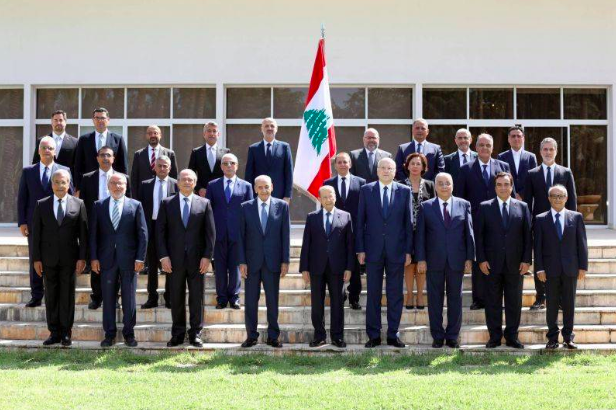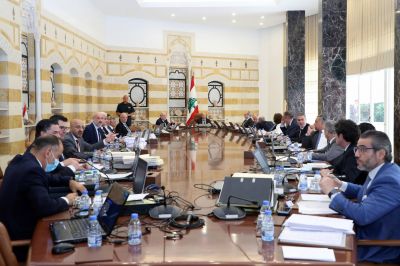
Prime Minister Najib Mikati's cabinet is photographed with President Michel Aoun. (Credit: Dalati & Nohri)
Before its mandate and that of the outgoing Parliament expired, the Mikati cabinet left behind an economic recovery plan designed in agreement with the International Monetary Fund.
This agreement would allow Lebanon to benefit from $3 billion in aid and potentially attract other donors thanks to the IMF.
The vast majority of experts consider the conclusion of an agreement with the international institution an essential step toward a resolution of the crisis, since it will allow the release of structural aid that the land of the cedars urgently needs.
However, the Lebanese political class does not quite see it in this light. Officially, no one is against a deal with the IMF, or even the restructuring of the banking system, which is also considered an indispensable step.
But as soon as the topic of the distribution of losses — which are estimated at around $70 billion — is raised, the entire political spectrum agrees, with slight differences, on the need to protect depositors.
While not all the details of the Mikati cabinet’s plan were communicated, the plan, according to information obtained by L’Orient-Le Jour, makes it possible to protect 92 percent of depositors.
Deposits up to $100,000 will be protected, even if the latest version of the plan limits its wording to the protection of “as many deposits as possible.”
In a country where the vast majority of deposits are held by a small minority of people, it is the future of large depositors and the banking sector, in general, that is at stake.
However, no compensation is planned at the moment for the amounts exceeding this ceiling, even though the plan suggests a bail-in, thus converting these sums into shares, to the great displeasure of the banks’ current owners, who are called on to recapitalize to guarantee the survival of their institutions. This is especially true since the Mikati cabinet’s plan would cancel “a large part” of commercial bank’s assets placed in the central bank.
However, since the beginning of the crisis, the banks have been lobbying for the state to take part in the compensation for losses, suggesting that it should sell these assets, which the Association of Banks in Lebanon estimates at $40 billion. This figure is strongly disputed. L’Orient-Le Jour sheds light on the position of each of the actors.
The Free Patriotic Movement
Unacceptable. This is how Alain Aoun, MP for Baabda and top official in Gebran Bassil’s FPM, described the economic recovery plan proposed by Najib Mikati’s cabinet. While the FPM does not mince its words, it is because, according to Aoun, the proposed roadmap “places the bulk of the losses on the depositors.”
“While depositors pay, the state does not assume its responsibility. The plan writes off BDL’s losses and acts as if nothing had happened,” added Aoun, for whom the Lebanese state must incur its share of the losses by “using all its assets.”
“I am not necessarily talking about privatization. But I don’t see why the state should not invest in its assets, for example through partnerships with the private sector, if this can generate income capable of reducing the burden on depositors.”
Aoun goes back over a proposal made in the early hours of the crisis by ABL. The idea is to create a sovereign wealth fund in which the assets of the Lebanese state would be invested (which ABL valued at some $40 billion, which a study by Albert Kostanian, Senior Policy Fellow for Economics at the AUB Issam Fares Institute valued at only $14 billion) in order to reduce the financial sector’s losses.
Many activists and experts, however, believe that the privatization of the state assets ultimately means that the entire population will pay for the losses, as these assets are publicly owned.
Instead, these observers often call for bank owners to bear the brunt of the losses, as they are largely responsible for the sector’s collapse by making profitable and highly risky investments in BDL.
Commenting on the bail-in, which Lebanese banks fear most, Aoun said that the FPM is open to the proposal, while specifying that it is a “tool, not an end in itself.”
Finally, the MP criticized the lack of an economic vision in the plan. “A recovery plan should be based on growth, not on filling a financial gap,” he said.
Progressive Socialist Party
On Walid Joumblatt’s side, the recovery plan is still under study. Speaking to L’Orient-Le Jour, an MP of the PSP bloc said that the PSP elected officials will take a clear position on the matter later this week.
However, he said that “the plan seems to express a lot of bad faith towards depositors. … It is simply a revised version of the Lazard plan,” he said.
Hassan Diab’s cabinet had indeed drawn up an economic and financial recovery plan in 2020 in consultation with the Lazard firm. While the current plan is broadly based on the 2020 plan, it is much more austere, and provides for a much larger haircut on deposits, for example. However, the plan was attacked by the political and financial elite, and was eventually discarded.
Amal
Despite the close relationship between the Amal movement and caretaker Finance Minister Youssef Khalil, the political bloc of Parliament Speaker Nabih Berri has yet to take an official position on the recovery plan, pending the publication of the final version.
Berri “looks unfavorably on the text,” said a person close to the Parliament speaker. “A deposit is a deposit, regardless of its size. It is a right for the depositor,” said the source. “What we are proposing is that the losses do not affect people’s capital, but rather the profits they made. It is therefore a question of cutting from the high interest rates accumulated by some, rather than on some deposits,” the source added.
As a reminder, the financial sector’s losses exceed $70 billion. Berri could be fearing the ire of Shiite expatriates in Africa, a majority of whom are Amal supporters. These “large depositors” are indeed afraid of seeing their savings in Lebanon sacrificed in favor of a plan with the IMF.
Commenting on the privatization, which the banking sector put forward as a key to reducing losses, Amal stated that it is opposed to the privatization of state assets, while favoring a partnership with the private sector to generate income through public assets.
Lebanese Forces
The Lebanese Forces have immediately announced, via the head of their parliamentary political bloc Georges Adwan, that they disagree with the economic recovery plan.
Speaking to L’Orient-Le Jour, the newly elected LF MP for Metn, Razi al-Hajj, confirmed the reservations expressed by Samir Geagea’s party on the matter.
“We have criticisms, both on the form and on the content,” he said. “On the form, we believe that it is unacceptable to rush the passing of such an important plan during the last cabinet session. On the contrary, there must be a public debate on the plan,” the young MP said.
However, some experts believe that, after almost three years since the start of the economic and financial crisis that caused the national currency to lose 90 percent of its value, the government must act very quickly, particularly since a prolonged power vacuum seems more and more likely.
“In substance, we believe that this plan is unfair to depositors. For example, for me at least, deposits should not be classified by value, but rather by how they were compounded. For example, an employee or institution that saves monthly cannot be equated with an individual who leaves his or her money sitting around to take advantage of interest rates,” he added.
It should be also noted that the current plan largely protects small savers, preserving more than 90 percent of deposits.
“In addition, there is no explanation as to why banks are losing their assets with BDL, unlike the Eurobond holders. The plan does not include opening the financial sector to foreign investors and banks,” Hajj said about the restructuring of the banking sector, while denying claims that the LF is taking a stance in favor of banks.
Hezbollah
Hezbollah ministers opposed the economic rescue plan during the cabinet session dedicated to the debate on the issue.
Hezbollah did not respond to L’Orient-Le Jour’s requests for comment.
The party believes that “the plan is unfair to the depositors,” said a source close to the party. Hezbollah believes that “the depositor’s right is sacred.”
The party is also opposed to any increase in taxes, especially those affecting consumption such as VAT.
In recent statements, MP Hassan Fadlallah, a member of Hezbollah, recalled the “the banks’ responsibility” in the current crisis.
The protest movement
The protest movement groups, which emerged as a major political player after the May 15 legislative elections, having succeeded in electing 13 or 14 MPs, do not intend to withdraw from the debate on the economic recovery plan.
Contacted by L’Orient-Le Jour, Waddah Sadek, MP for Beirut claiming to represent the protest movement, said that negotiations are underway between the elected MPs to unify their position on the subject.
“We agree for the moment on key points. For example, we are opposed to the sale of state assets to compensate for the losses of the financial system,” he said.
Albert Kostanian’s study for the Issam Fares Institute concludes that the sale of government assets would not be able to solve the crisis.
Indeed, the value of these assets is far less than the size of the losses, especially since they will probably be sold at a reduced price given the current crisis.
The study estimates that privatization revenues would range from $5.88 billion to $13.36 billion, under realistic assumptions.
Sadek said the parliamentary bloc is not ideologically opposed to the notion of public-private partnerships.
“However, it is up to the banks and corrupt politicians, to whom we attribute criminal responsibility, to bear the responsibility for the losses first and not to the public domain,” he explained.
Sadek added that he opposes the recovery plan, which he sees as an “accounting balance sheet, not an economic recovery plan.”
“The plan is completely devoid of any real economic vision. It is simply an arithmetic distribution of losses,” he said.
As time goes by, this distribution becomes increasingly severe.
This article was originally published in French in L'Orient-Le Jour.
